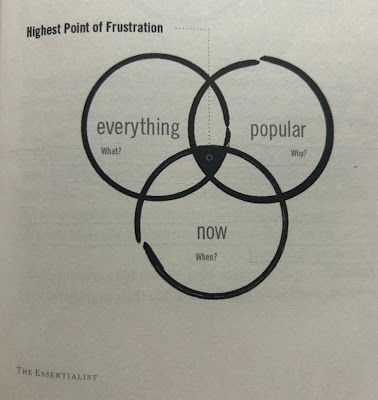So what then is the Core of the Essentialist, the thing that Essentialists should be about?
McKeown starts with some basic mindset assumptions:
1) Individual choice: "We can choose how to spend our energy and our time."
2) The prevalence of noise: "Almost everything is noise, and a very few things are exceptionally valuable."
3) The reality of trade offs: "We can't have or do it all...Once we accept the reality of trade-offs, we stop asking 'How can I make it all work?' and start asking the more honest question 'Which problem do I want to solve?'"
How do we get to this point of decision? There is a simple, three step method that McKeown proposes.
1) Explore: Discerning the trivial many from the vital few
To do this, the Essentialist explores and evaluates many options before committing to any one of them. In fact, they explore more options than the Nonessentialist to make sure they make the right choice.
The Nonessentialist
Given the reality of tradeoffs, we cannot choose everything - but if we do not choose for ourselves, others will choose for us.
Years from now, suggests McKeown, we may have many regrets - but he believes Essentialism will not be one of them: "What would you trade then to be back here now for one chance - this chance - to be true to yourself? On that day, what will you hope you decided to do on this one?"
Or, as quoted before, "Tell me, what is it you plan to do/with your one wild and precious life?" (Mary Oliver)



I see a lot of the top graphic happening these days among our government administrations.
ReplyDeleteI myself probably fall mostly in the second graphic though I do admit I have a problem saying no to social pressure sometimes when I would have been better served, and probably the other party to, by me saying no.
Striving towards the last graphic should be all our goals but I'm not sure I've ever met anyone who was a master of that.
I am slowly slogging to get yo the second graphic, Ed. It is very hard for someone who has such a broad range of interests.
DeleteThis sounds like an excellent explanation of Philippians 1:10, "so that you may approve the things that are excellent. . ." Approve is Strong's Greek Concordance 1381, δοκιμάζω (dokimazo). It means to discern, which I like to plug in, so that it's an admonition to discern and pursue the things that are excellent.
ReplyDeleteThere are many, many good things to do, but the best goal should be to pursue not just good things, but excellent things. I confess I don't always know what those things are, but it helps to ponder them before acting on impulse.
That is a really great idea Leigh (and great use of Greek!). It really is about discerning the best thing not just necessarily a series of good things. Like you, I don't think I know either. But I think the fact that we think about these things is the starting point. If there is anything I have gotten from this book today, it is the importance that.McKeown Puts into thoughtfully, making decisions, not just lumbering into them.
Delete